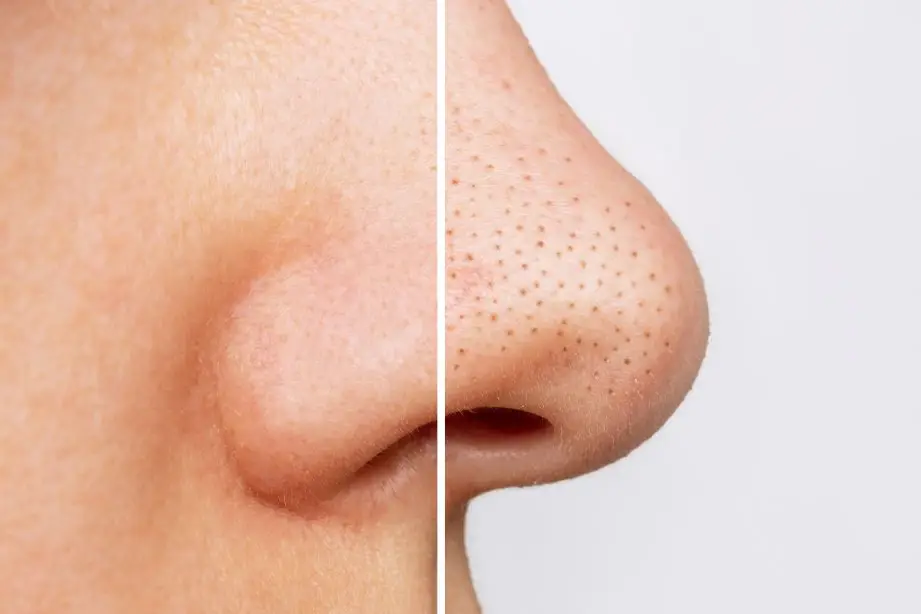Blackheads are a common skincare concern for many, manifesting as small, dark spots on the face. Their presence can be both a cosmetic and dermatological issue, affecting individuals of all ages. But what exactly are blackheads, and why do they appear?
This section will shed light on the basics behind blackheads, setting the stage for a deeper understanding of their causes and differences from other types of skin blemishes.
Key Takeaways
- Blackheads form due to a combination of hormonal changes, excess sebum production, and the accumulation of dead skin cells.
- Distinguishing between blackheads and whiteheads is crucial for selecting the appropriate treatment strategy.
- Over-the-counter products containing salicylic acid and benzoyl peroxide are effective first-line treatments for blackheads.
- Prescription medications and professional treatments like chemical peels and microdermabrasion offer more powerful solutions for persistent blackheads.
- Natural remedies, including tea tree oil and green tea, can be used to treat and prevent blackheads, though they should complement rather than replace conventional treatments.
- Consistent skincare routines are vital in preventing the formation and recurrence of blackheads.
The Causes of Blackheads
The formation of blackheads is primarily due to hormonal changes that lead to increased sebum production. Sebum, when overproduced, can mix with dead skin cells and clog the hair follicles on your skin. This clog becomes a blackhead when it is exposed to air and oxidizes, turning it black.
- Hormonal fluctuations can significantly impact sebum production, making blackheads more prevalent during puberty, menstruation, and certain stages of life.
- Dead skin cells contribute to the problem by blocking the oil from reaching the skin’s surface, creating an ideal environment for blackheads to develop.
- Lifestyle and environmental factors such as diet, stress, and humidity also play a role in the formation of blackheads by either exacerbating skin oiliness or contributing to skin cell turnover issues.
For those looking to dive deeper into the science of sebum production and its effects on the skin, the Cleveland Clinic provides an in-depth look at these mechanisms.
Identifying Blackheads
Understanding how to identify blackheads is crucial for effective treatment and prevention. Blackheads are small, dark lesions that appear on the skin due to clogged hair follicles. They are a type of comedo, which can be either open (blackhead) or closed by skin (whitehead).
- Blackheads are distinguished by their open surface, which leads to the black appearance due to oxidation, not dirt.
- Whiteheads, on the other hand, are formed when the pores are completely blocked, trapping the sebum, dead cells, and bacteria inside, leading to a white or yellowish appearance on the surface.
The Cleveland Clinic provides valuable insights into distinguishing between blackheads and whiteheads, offering guidance on identification and the initial steps towards effective skin care.
In conclusion, understanding the basics behind blackheads, from their causes to identification, sets the foundation for effective prevention and treatment strategies.
Over-the-Counter Solutions
Navigating the myriad of over-the-counter (OTC) products for blackhead removal can be daunting. However, products containing salicylic acid and benzoyl peroxide stand out for their effectiveness.
- Salicylic acid works by dissolving the type of skin debris that clogs pores and leads to blackheads. It’s not just effective; it’s also suitable for daily use, acting gently to prevent the buildup of dead skin cells without causing irritation.
- Benzoyl peroxide is another powerhouse ingredient, known for its ability to kill bacteria underneath the skin. It also helps to remove excess sebum and dead skin cells, making it a valuable tool in your blackhead-fighting arsenal.
For more details on these ingredients and how they combat blackheads, the Healthline article provides an excellent resource.
Prescription Medications and Professional Treatments
When OTC products are not enough, prescription medications and professional treatments can offer a more powerful solution.
- Prescription-strength retinoids are among the most effective treatments, speeding up cell turnover and preventing the clogging of pores. These medications can significantly reduce blackheads over time by keeping pores clear of blockages.
- Professional treatments such as chemical peels and microdermabrasion go a step further, offering direct removal of the clog and dead skin cells that cause blackheads. These treatments should be performed by a dermatologist or skincare professional to ensure safety and effectiveness.
The Cleveland Clinic’s article on professional treatments offers a closer look at these options, providing insights into what patients can expect.
Home Remedies and Natural Solutions
For those seeking a more natural approach to blackhead removal, home remedies can be surprisingly effective.
- Tea tree oil has been shown to reduce sebum production and fight acne, including blackheads. Its antibacterial properties make it an excellent natural alternative.
- Green tea is another natural remedy worth considering. Not only can it reduce oil production, but it’s also packed with antioxidants that benefit skin health overall.
These natural solutions can be effective but should be used with caution and in conjunction with professional advice to ensure they’re suitable for your skin type.
FAQs
Do blackheads go away on their own?
No, blackheads typically do not go away on their own. They require treatment to remove the clog from the pores. Neglecting blackheads can lead to persistent blemishes and, in some cases, acne outbreaks.
Is it okay to squeeze out blackheads?
It is generally not recommended to squeeze blackheads as it can lead to skin irritation, infections, and scarring. Instead, use recommended treatments or seek professional help for removal.
How can diet affect blackheads?
Diet can influence skin health; foods high in sugars and fats can increase sebum production, potentially worsening blackheads. A balanced diet rich in antioxidants and omega-3 fatty acids can promote healthier skin.
Why do blackheads reappear?
Blackheads can reappear due to ongoing factors such as hormonal fluctuations, improper skincare routines, or the use of comedogenic products that clog pores. Consistent and proper skin care is essential to prevent their recurrence.

